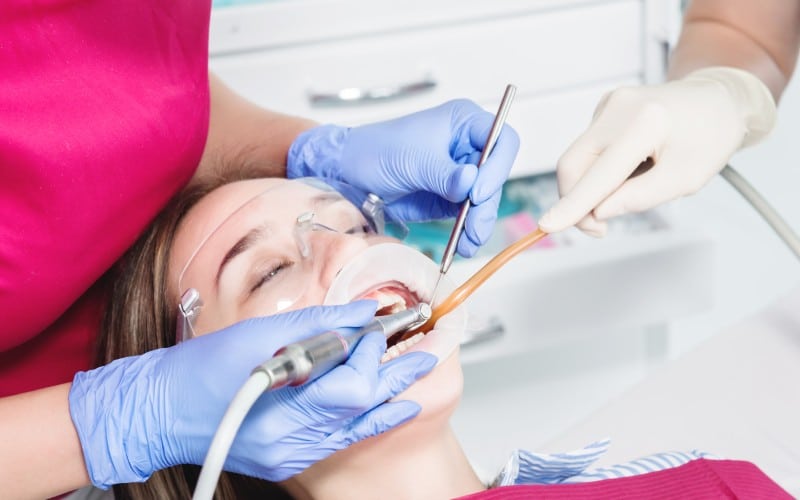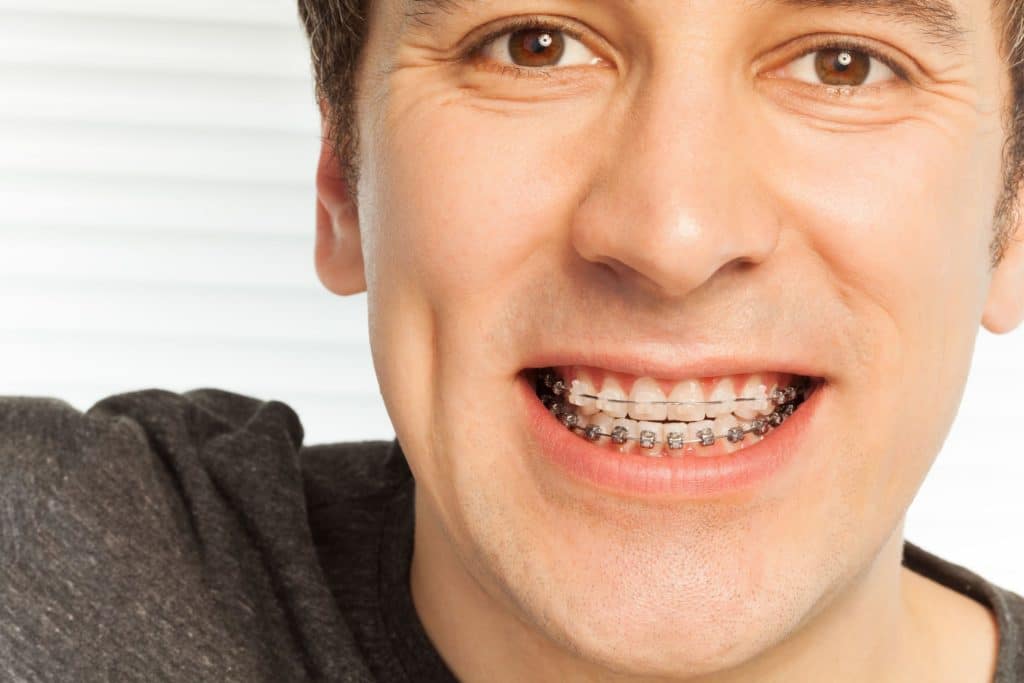Regular dental cleanings are an important part of maintaining oral health. However, some people are concerned about having to take time out of their busy day to attend an appointment. Going to the dentist may seem like a hassle, but the good news is that cleanings don’t take long, but provide significant benefits. For optimal benefits, having a cleaning every six months (or every three or four months if needed and your insurance covers it) is recommended.
While the duration of a dental cleaning can vary, influenced by several factors, there is a typical procedure and timeline you can expect.
Table of Contents
ToggleKey Takeaways
- Duration of Dental Cleanings: Dental cleanings typically last between 30 to 60 minutes, depending on factors such as the extent of plaque and tartar buildup, and the thoroughness of the cleaning required.
- Painless Procedure: Most patients find dental cleanings to be painless, with minimal discomfort or sensitivity. Dental professionals use specialized tools and techniques to ensure a comfortable experience.
- Importance of Regular Cleanings: Regular dental cleanings every six months are essential for maintaining optimal oral health. They help remove plaque and tartar buildup, prevent cavities and gum disease, and freshen breath.
- Complement to Home Care: Even with diligent at-home oral care, professional dental cleanings are necessary to reach areas that may be missed with brushing and flossing alone. Cleanings complement daily oral hygiene efforts and help prevent future dental issues.
- Preventive Benefits: Dental cleanings not only enhance oral hygiene but also offer preventive benefits by providing an opportunity for early detection of dental issues and personalized oral health recommendations.
- Safe and Effective Procedure: Dental cleanings are safe and effective procedures performed by dental hygienists or dentists. They play a crucial role in preventing more extensive and costly dental procedures such as fillings, root canals, and extractions.
- Convenient Scheduling: Scheduling a dental cleaning is easy and convenient. Patients can contact their dental office or dentist’s practice to book an appointment that fits their schedule. Regular attendance of cleanings is essential for maintaining optimal oral health.
What Happens During a Dental Cleaning?
A dental cleaning removes plaque and tartar from your teeth and gums. The process begins with a thorough examination by the dentist or dental hygienist. X-rays may be taken to assess the overall health of your teeth and identify any potential issues that may not be visible during the visual examination.
Next, the actual cleaning process begins. The dental hygienist uses specialized tools to remove bacteria-containing plaque and tartar buildup from the surfaces of your teeth and along the gumline. This process, known as scaling, helps prevent gum disease and cavities.
Your teeth are then polished to remove surface stains and smooth the tooth surfaces. This makes it more difficult for plaque and tartar to accumulate again. Finally, a fluoride treatment may be applied to strengthen your teeth and provide additional protection.
Factors Affecting Cleaning Duration
The condition of your teeth and gums plays a significant role in how long your cleaning will take. If you have a healthy oral hygiene routine and visit the dentist regularly, expect the cleaning process to take about an hour. If you haven’t had a professional cleaning in a while, the first visit after a long break may take a bit longer. The amount of plaque and tartar on your teeth directly influences the duration of the cleaning; a heavier buildup takes longer to remove. Those with a history of dental issues may take longer to ensure these concerns are addressed, too. Your dentist and dental hygienist will take as long as necessary, though, to ensure the job is completed properly.
Average Duration and Time Allocation for Cleaning Tasks
On average, a routine dental cleaning typically takes an hour. This includes the examination and X-rays, scaling, polishing, and fluoride treatment. Your time will vary based on your oral health and individual situation.

Why Dental Cleanings Are Important
Regular dental cleanings play a crucial role in maintaining oral health by helping prevent gum disease and cavities by eliminating tartar, plaque, and the bacteria associated with these buildups. Checkups and cleanings also allow for early detection and intervention. Dental issues are avoided, or caught before they can become more significant.
Avoiding Regular Care Could Result in More Time in the Chair
Skipping regular dental cleanings could make you more likely to face serious dental problems that need big and urgent fixes later on. Without those routine cleanings, issues like advanced gum disease or deep cavities can develop, and require longer and more complicated treatments. In addition to taking up more of your time in the dental chair to treat these issues, advanced dental problems are often painful, and treatments tend to be more expensive. Making the time to have regular cleanings is an investment in saving time and discomfort later on.
Appointments That Feel Shorter
If you are concerned about how long the procedure will take because of dental anxiety or because you find it a hassle, it helps to shift from thinking about how much a dental cleaning is going to take time out of your day and instead focus on the benefits to your oral health. The potential consequences of neglecting oral health, such as gum disease, cavities, and more extensive dental procedures make it clear that the benefits far outweigh any hassle.

It’s also important to remember that when a dental cleaning takes longer than average, although it might initially seem inconvenient, it also emphasizes that the procedure is especially necessary. Extended cleaning times may be necessary when dealing with severe buildup or other advanced issues. Dental professionals are dedicated to ensuring that your oral health is effectively addressed, even if it requires a more extended cleaning session.
Another helpful idea is to choose a friendly dentist and dental office team you are comfortable with, as this will make the time spent seem shorter and make it easier for you to keep up with regular appointments.
While taking time out of your busy schedule may seem a hassle, these cleanings don’t take long, but are a critical part of your oral health care.
Orchard Park Dental offers friendly, welcoming dental services, conveniently located in Stoney Creek. We make every effort to make you feel more comfortable, so time won’t feel like it’s dragging. Plus, we’ll schedule appointments efficiently, so you don’t lose time waiting for your appointment to start.
For efficient and comfortable teeth cleaning Stoney Creek, contact Orchard Park Dental at 905-664-7252 or visit 6-483 Hwy 8 Stoney Creek ON L8G5B9. Experience exceptional dental care with us today!
Frequently Asked Questions
How long do dental procedures typically take?
The duration of a dental procedure varies depending on its complexity and the treatment being performed. Some procedures, such as dental cleanings or fillings, may take around 30 minutes to an hour, while others, like dental implants or orthodontic treatments, may require multiple appointments and several months to complete.
Are dental procedures covered by insurance?
Many dental procedures are covered by dental insurance plans, but coverage varies depending on the type of procedure, your insurance provider, and the terms of your policy. It’s essential to check with your insurance company to understand your coverage and any out-of-pocket expenses.
What should I expect during a dental procedure?
During a dental procedure, your dentist will explain the treatment process, answer any questions you may have, and ensure your comfort throughout the procedure. Depending on the treatment, they may use specialized instruments, equipment, or technologies to achieve the desired results.
How can I prepare for a dental procedure?
Before a dental procedure, your dentist may provide specific instructions to follow, such as fasting if sedation is involved or taking antibiotics if necessary. It’s essential to follow these instructions carefully and communicate any concerns or medical conditions with your dentist beforehand.
Are there risks associated with dental procedures?
Like any medical intervention, dental procedures carry some risks, although complications are rare. Your dentist will discuss potential risks and benefits with you before proceeding with any treatment and take necessary precautions to minimize risks.

After attending McMaster University to obtain his Health Science undergrad degree, Dr. Christopher Sims made his way to Toronto to complete his DDS degree at the University of Toronto. But his education didn’t stop there.
He’s completed a number of additional courses to best serve his patients and be able to educate them too. No matter your age or dental condition Dr. Sims can assist you in a professional manner and loves answering any of your questions or concerns.
Dr. Sims grew up in Grimsby playing basketball, so he’s always up for talking about the Raptors! He’s also a football fan – go Buffalo Bills! In his free time, if he’s not watching a basketball game or football game, you’ll likely find him working out, cooking (got any new recipe ideas?), and of course, spending time with his amazing family.










